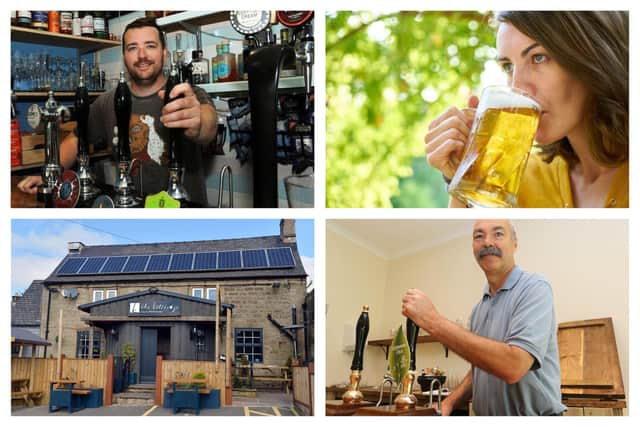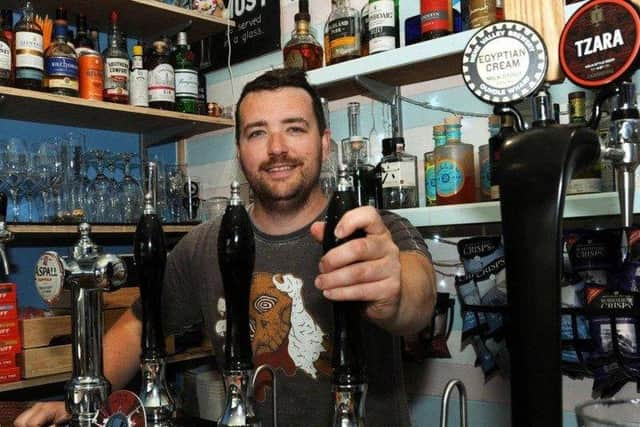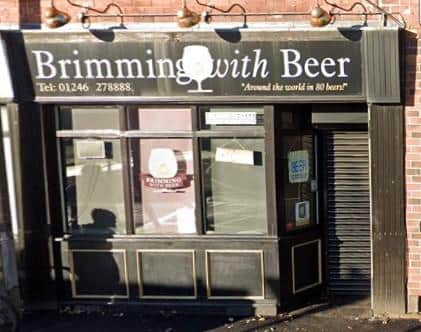Crisis-hit pubs demand more support - but Chesterfield micro-pubs buck the trend
and live on Freeview channel 276
People shelled out more money in the pub when allowed back indoors, figures suggest, but limits on social contact mean spending is still below pre-pandemic levels.
Now hospitality and pub industry leaders have written to Prime Minister Boris Johnson demanding support for their sector following the four-week delay to the so-called ‘freedom day’ and the planned lifting of all restrictions.
Advertisement
Hide AdAdvertisement
Hide AdBanking firm Revolut analysed 4,000 customers in Chesterfield between May 17 – when indoor hospitality resumed – and June 13.
It found Chesterfield punters spent 66 per cent more in pubs over this period than the previous month, when only outdoor hospitality was allowed – but spending was still 59 per cent below February 2020, before the coronavirus pandemic struck.
Mr Johnson pushed back the end of England’s coronavirus restrictions to July 19, due to concerns over Covid-19’s rapidly spreading Delta variant.
Pubs across the country had been preparing to welcome customers back with no limits on social contact or group sizes from June 21.
Advertisement
Hide AdAdvertisement
Hide AdThe British Beer and Pub Association, UK Hospitality and the Campaign for Real Ale say they are “bitterly disappointed” by the delay, which they estimate will cost pubs £400 million.


A spokesman said: “Our sector is facing one of its toughest periods in its history and this latest delay is yet another setback.
“Many pubs cannot break even under current restrictions and about 2,300 still remain closed.
“It is critical the Government provides our sector with further support.”
Advertisement
Hide AdAdvertisement
Hide AdOffice for National Statistics figures show UK pubs had been under increasing pressure before the pandemic – the number fell to 38,900 in March 2020, from 52,500 in 2001.


In Chesterfield, this figure fell from 120 in 2001 to 85 in 2020.
Rough ride for hospitality
The All Saints Tap announced it was closing last month, saying: “Hospitality has had a rough ride up to now and has been hit harder than most.”
Helen Marshall, manager of The Kelstedge, Kelstedge, admitted all pubs would have liked more Government support to help them through the pandemic.


Advertisement
Hide AdAdvertisement
Hide Ad“We’re just relieved we can reopen inside as well as outside,” she said, “but there are still a lot of rules in place – there are quite a few customers that are fed up with it now.”
Miss Marshall, who was placed on furlough during the pub’s enforced closure, said it was busier now than before the pandemic, thanks to a substantial investment during the forced closure, as well as a new menu.
She put the industry’s pre-pandemic troubles down to a mixture of things, including lifestyle changes and the homogenisation of chain pubs, while the rise in at-home drinking is also a threat, although not one affecting her pub.
“Everywhere you go, it is the same atmosphere, the same menu and there’s so much competition when you want to just go out for a bite to eat, wherever and whenever.
Advertisement
Hide AdAdvertisement
Hide Ad“Just before we reopened, a lot of people were saying ‘why would you go out when people have learned to drink at home’, but we don’t have a lot of people coming out to get drunk.
“It’s the social aspect, we have a lot of customers who like to come out to be social. We have some elderly customers, it might be their only social interaction of the week, with our staff.


“As soon as we reopened, we realised how much people have missed the social aspect, not just the drinking.”
Micropubs buck the trend
Micropubs also seem to be bucking the trend and are rising in popularity.
Advertisement
Hide AdAdvertisement
Hide AdA planning application has just been approved for The Beer Station to convert a retail unit on Station Road, Whittington Moor, into a pub.
Ben Stephenson, who launched Brimming with Beer in Brimington five years ago, puts the success of down to the personal touch – but equally called for more support.
“It’s been tough,” he said. “I knew the support wasn’t necessary going to be enough to keep going – I went back to my old job driving wagons just to make sure I had enough money.
“I got a grant at Christmas of £1,000, but I can take that in a day at Christmas.”
Advertisement
Hide AdAdvertisement
Hide AdHe added home deliveries to support the business during closure – but customers have flocked back since restrictions were lifted and, thanks to “a lot of hard work”, he is now looking forward to a brighter future.
“It’s the personal experience,” he says. “I know most of the other landlords of Chesterfield’s other micropubs and they will say the same. I know 90 per cent of the customers by name, which you don’t get in bigger venues.
“If you come in alone, you’re not stood in the corner, you’re involved in a conversation, with me, or people around you – you’re not all alone in the corner on your phone, which can happen in a larger pub.”
For Stephen Eyre, the secret of his micro-pub’s success was a gap in the market.
Advertisement
Hide AdAdvertisement
Hide AdHe ran the Walton Dam Nation for four years, until selling to the owners of Coffee Bean Nation earlier this year, who reopened it as Maggie May’s.
He said the business was always a five-year plan, but the pandemic meant he pulled out a year early after enjoying the enforced break.
He said he survived the pandemic due to having a regular job for his main income, coupled with being able to furlough staff and a supportive landlord.
“I think the reason the Dam Nation took off was the fact there was no pubs in Walton,” he says. “That was one of the selling points, for people wanting to come in and sit down and have a pint.
Advertisement
Hide AdAdvertisement
Hide Ad“There were a few days at the start where you wonder ‘what have I done’, but that’s a psychological issue with any small business. Word got around and it took off.”
A spokesperson for Chesterfield Borough Council said a scheme was in place to support businesses which are struggling and severely impacted by COVID-19.
They added: “If a business has more than a 20 per cent loss of income then we are happy to review their claim, we will just require profit and loss statements so that we can carry out a full assessment.
“It is our intention to help and support as many local business as we can during these difficult times.
Advertisement
Hide AdAdvertisement
Hide Ad“The council regularly reviews the grant schemes to ensure that they best support our local businesses. We advise all businesses to visit our website for the latest schemes and eligibility and to contact us if they have been severely impacted as a result of the COVID-19 pandemic.”
